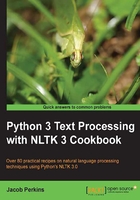
What this book covers
Chapter 1, Tokenizing Text and WordNet Basics, covers how to tokenize text into sentences and words, then look up those words in the WordNet lexical dictionary.
Chapter 2, Replacing and Correcting Words, demonstrates various word replacement and correction techniques, including stemming, lemmatization, and using the Enchant spelling dictionary.
Chapter 3, Creating Custom Corpora, explains how to use corpus readers and create custom corpora. It also covers how to use some of the corpora that come with NLTK.
Chapter 4, Part-of-speech Tagging, shows how to annotate a sentence of words with part-of-speech tags, and how to train your own custom part-of-speech tagger.
Chapter 5, Extracting Chunks, covers the chunking process, also known as partial parsing, which can identify phrases and named entities in a sentence. It also explains how to train your own custom chunker and create specific named entity recognizers.
Chapter 6, Transforming Chunks and Trees, demonstrates how to transform chunk phrases and parse trees in various ways.
Chapter 7, Text Classification, shows how to transform text into feature dictionaries, and how to train a text classifier for sentiment analysis. It also covers multi-label classification and classifier evaluation metrics.
Chapter 8, Distributed Processing and Handling Large Datasets, discusses how to use execnet for distributed natural language processing and how to use Redis for storing large datasets.
Chapter 9, Parsing Specific Data Types, covers various Python modules that are useful for parsing specific kinds of data, such as datetimes and HTML.
Appendix A, Penn Treebank Part-of-speech Tags, shows a table of Treebank part-of-speech tags, that is a useful reference for Chapter 3, Creating Custom Corpora, and Chapter 4, Part-of-speech Tagging.